Fighting the Tides — Directing The Champion
The Champion is the best work I ever did. It was the second of two series I directed that were written by Maurice Gee and produced by Ginette McDonald: The Fire-Raiser in 1986, and The Champion in 1989.
From the moment I read Maurice's script, I couldn’t wait to turn it into pictures. It was a wonderful amalgam of light and darkness, the cheerful madness of the Pascoe family contrasted with the realities of everyday life during World War ll. Its purpose was family entertainment, but there was a darkness in the way it confronted serious issues, particularly racism. While there’s plenty of adventure and laughter, it can rapidly disappear; as typified by the bleak, powerful ending.
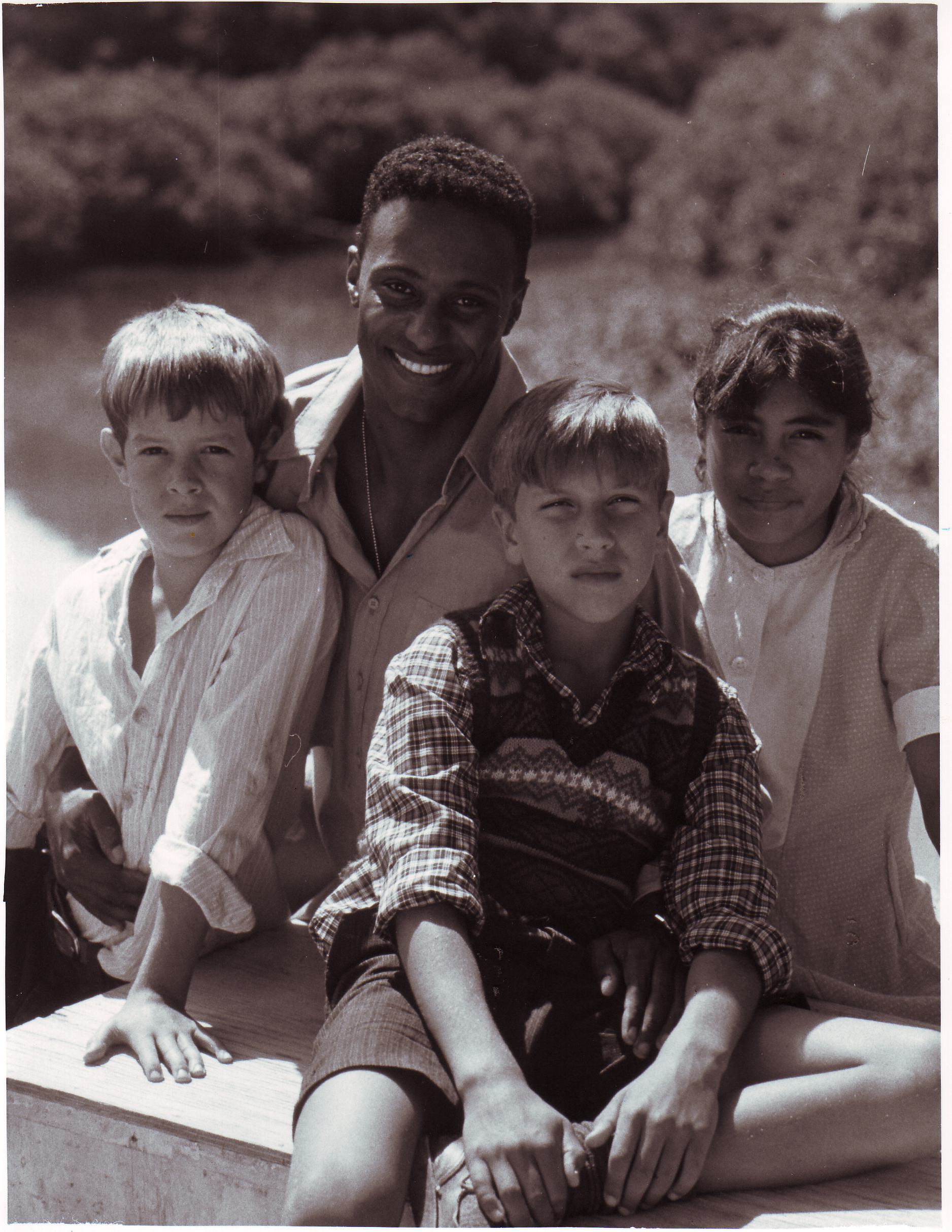
Left to right: Scott Harman (as Leo), Michael James (Private Jackson Coop), Milan Borich (Rex), and Louise Perry (Dawn).
It was the last production out of the TVNZ Drama Department as it morphed into South Pacific Pictures, and I have always felt the show lapsed into an undeserved obscurity. Following its commissioning, the corporation seemed reluctant to see it through to a conclusion. There were constant edicts to cut the budget, and getting it made was largely dependent on the grim determination of Ginette, and line producer Judith Trye. One cost-saving measure was not to include repeat rights in the actors’ contracts, so it was only broadcast once. It was badly scheduled at 6:00pm, up against the news on TV One, and poorly publicised. I still remember with indignation endless promos for Alf at 6:30pm, and MacGyver at 7pm on Sundays, and nothing in prime time promoting The Champion. It felt like a purposeful decision to let it live in obscurity.
One thing the budget did allow for was a trip to Los Angeles to cast the character of Jackson Coop, the wounded Afro-American GI in New Zealand on R&R. The role went to Michael James. It was a close run between him and Cuba Gooding Jr. — pre-Oscar, but post a highly acclaimed showing in Boyz n the Hood. I thought he had a too modern feel, as opposed to James’ gentler, more conservative characterisation. I still love this performance but wondered, as Cuba went up for his Oscar in Jerry Maguire, what an alternative version might have looked like.

Scott Harman (left) and Milan Borich get ready to run.
The whole cast was particularly strong and I hesitate to pick anyone out; but I will mention our two lead boys, Milan Borich and Scott Harmon, who played Rex Pascoe and Leo Yukich. They were ready for whatever came up, swarming over things, jumping off others, swimming in creeks, rivers and out to sea, canoeing through the mangrove swamps.
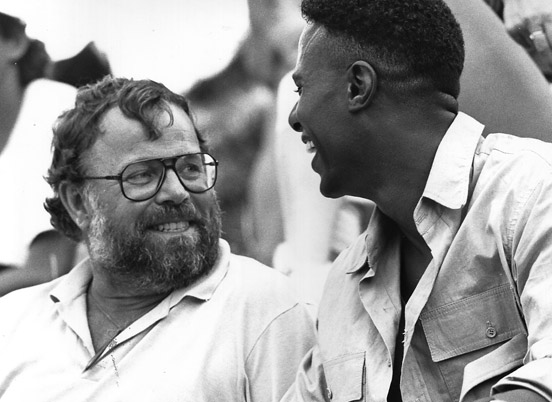
Director Peter Sharp and American actor Michael James.
We were shooting in the days before Work Safe, before OSH even, and while I like to think we were never stupid, I can’t imagine these days that we could shoot the scene with Rex dubbing Leo home on his bike, coasting downhill and falling off at the bottom, actually using two 12-year-olds [see clip two]. They loved it all; the hardest thing was stopping them swarming, jumping and coasting before the camera began rolling. This was a wonderful aspect of all the New Zealand kids I worked with. “I’ll do it! I’ll do it!”. “Not yet you won’t.” This in contrast to a number of American children I’ve directed who seemed overly keen to have a stuntman take over. “But you’re only climbing onto the kitchen table...”
Mud is a lasting memory of the shoot. Major locations were in the mangrove swamps around the Mahurangi, and in Armour Bay on the Manukau Harbour. Both have extensive mudflats that appear and disappear with remarkable rapidity. Filming needed meticulous planning to coordinate with the tides: the moment a canoe, barge or boat could float, or a body could swim, you had to be ready to shoot. There was simply no time to muck about. The essential pin in this was Mahurangi local Mike Cole. His intimate knowledge of the area was invaluable, and his skippering of Pooh and Piglet, his barge and boat, made filming possible.
Until you’ve floated through the mangroves on a calm, sunny, summer day, you have no idea how magical they can be. There were many rewards to filming there. It’s perhaps unfair to number among them a visit from my producer. Keen to see the process in the swamps, Ginette boarded Pooh to join us for an afternoon.
Once in position she succumbed to the magic, and decided that she ought to be of more practical help in the water with the crew, not sitting on Pooh thinking deep, productorial thoughts. She climbed off, unaware that on the port side — where the boys were exploring in their canoe — there was only a metre of water, and on the starboard side, where she got off so as not to cause a disturbance, there was a plunge to a three metre channel. Her sudden disappearance, though briefly noisy, didn’t cause much of a hold up, and proved the worth of Piglet in emergency situations, ferrying her back to base to dry off.
 Producer Ginette McDonald on set. Photos courtesy TVNZ
Producer Ginette McDonald on set. Photos courtesy TVNZTime and tide wait for no man, and the thought of slogging back to base through ankle-deep mud — even calf-deep mud — certainly concentrated the mind. We won, most of the time, though there can't be many who have forgotten the day we shot Rex's last scene; half a kilometre off the beach, chasing the ebbing tide out, and then the long haul back, heaving lights, equipment and props in front of the flooding tide. A sense of guilt still lingers at the cheery wave I gave the production manager as I headed for home, leaving him to contemplate the imminent arrival of high tide, all the equipment spread across the beach — and the grip vehicle trapped up to its axles in mud, a couple of hundred metres out to sea.
SPOILER ALERT: The next two paragraphs talk about the final moments of the series
The ending did prove contentious. After shooting the scene, it occured to me that it might be 'nice' to have a more comfortable conclusion, and actually finish on Rex in the bosom of his family, wrapped in a blanket with a cuppa and a scone. It was decided that 'nice' was insufficient justification, and to leave it as written.
After the episode screened, TVNZ's international sales department had other ideas. They scripted and shot a closing scene in which an adult Rex received a letter from Jack, safe in New York. Somehow, despite an inability to swim, he'd made it ashore from his sinking boat, survived a journey north catching fish and trapping rabbits, and successfully made it back to the States, pursued by the New Zealand police and US army MPs. I strongly believe it would have been better to leave things as per Maurice’s script, and hope that the official preserved copy doesn’t include the addendum.
During the development and filming of The Fire-Raiser and The Champion, there had been occasional talk of making it a trilogy. Sadly the right subject never quite made it to the surface, and changing times and politics separated the creative team.
- Peter Sharp's many directing credits include The Fire-Raiser, Mortimer's Patch and Erebus: The Aftermath.
Back to top
Going Back to the Creek
For Maurice Gee, certain words have a special power. Especially nouns. Two words in particular are so important to him, that he has named books after them. They have fuelled a number of his stories — including his script for The Champion.
Gee is well aware that "creek" and "kitchen" are ordinary words. But in his case they have a "special potency" — partly because they connect to his past. Gee grew up in Henderson, west of Auckland, in the 1930s and 40s, when it was still a country town, rather than part of a sprawling city. He spent so much of his childhood swimming, fishing, and playing in the local creek, that decades later he was still able to imagine what long sections of it looked like.
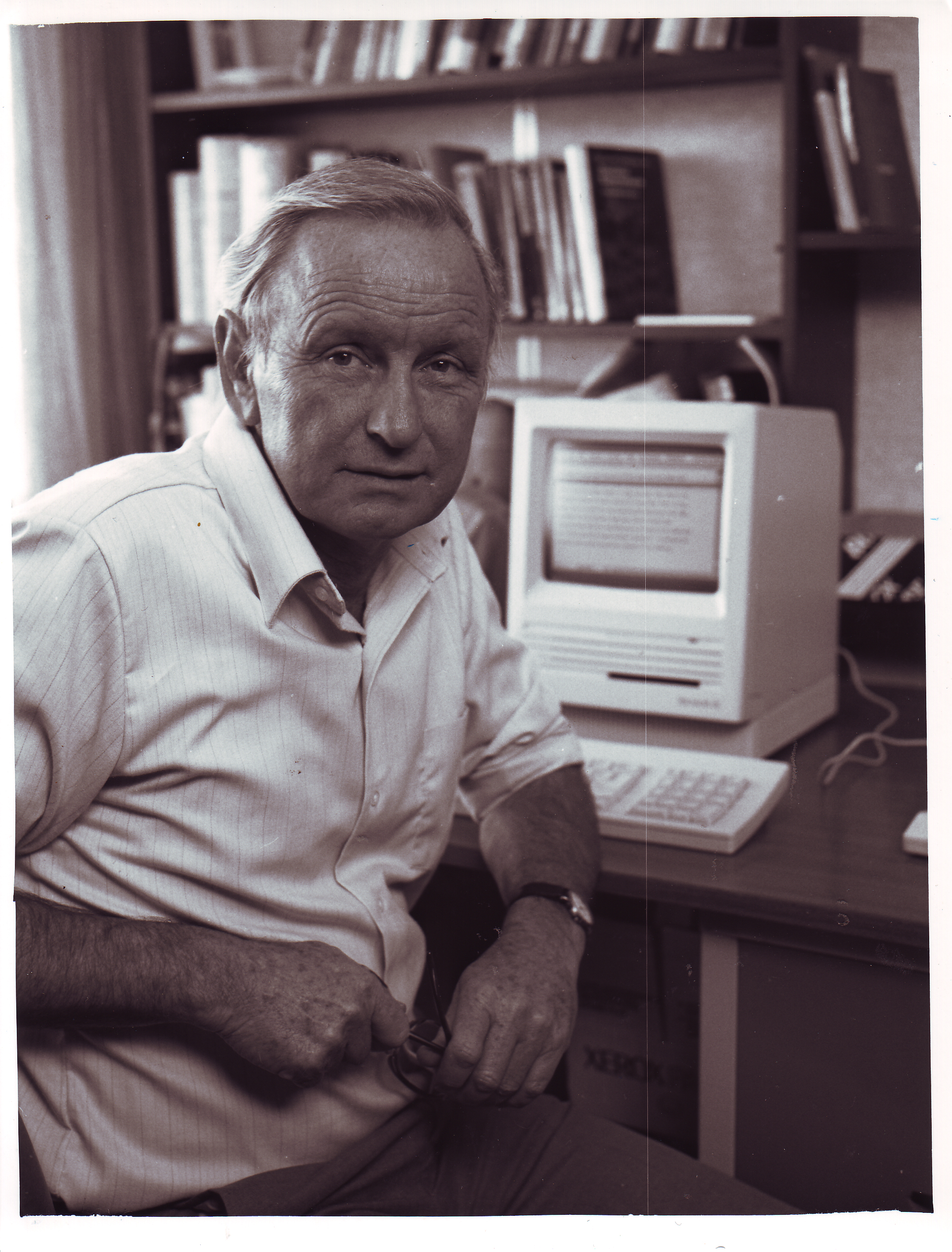
The Champion writer Maurice Gee. All photos courtesy TVNZ
The creek represented adventure and play — but also danger. He wasn't meant to visit alone. Thankfully there was always the option to run home. That's where the kitchen came in; for Gee, the kitchen was "the warm safe place", where his mother would be making some stew on the wood-fuelled range, or writing a story late at night, while warming her feet from the last heat inside the stove. "Creek" and "kitchen" are the two poles Gee moved between, during his childhood; they connect to memory and morality, and have provided creative fuel. "They underline for me the essential duality that every writer must know: familiarity/mystery, safety/danger, dark/light, good/evil".
In 1987, TVNZ called, hoping that lightning could strike twice. Gee's previous kidult script The Fire-Raiser had recently won acclaim, audiences and awards. TVNZ were keen to repeat that success — although Fire-Raiser producer Ginette McDonald reassured Gee that he wouldn't be expected to "attempt too strenuously to reproduce the unique ingredients" of the earlier show.
Gee came up with The Champion. It follows three 12-year-olds who live in the town of Kettle Creek, which is much like Henderson used to be — and especially Rex Pascoe, who is disappointed to discover that the American soldier his mother has arranged to stay with them for some R&R is "a negro". The story contained many elements from Gee's childhood, including the creek, the kitchen and the mangrove swamp — and memories of shooting the enemy with his BB gun, while American soldiers walked the streets of his town, handing out bubblegum.
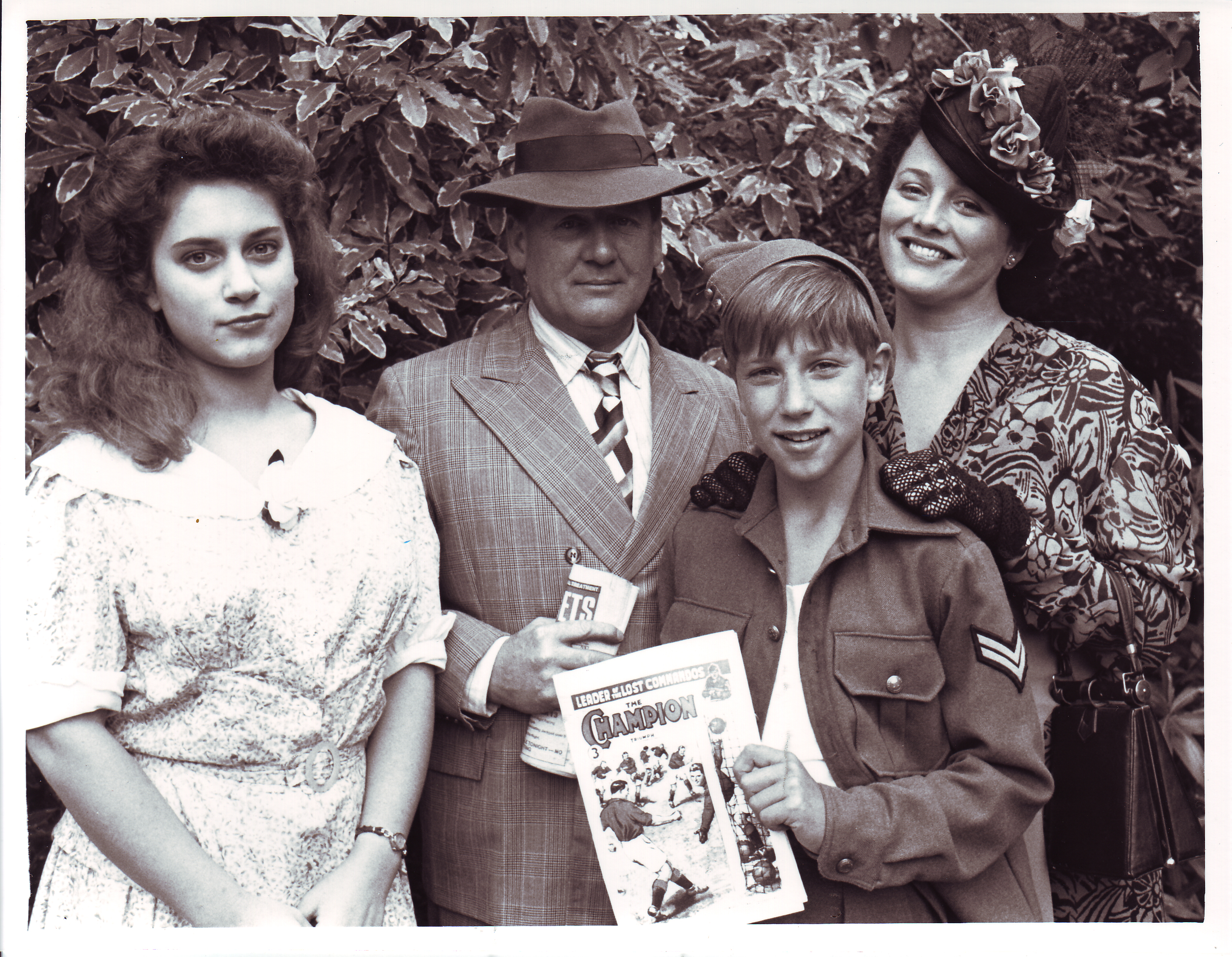
The Pascoe family: Gloria (Meredith Braun), Alf (Alistair Douglas), Rex (Milan Borich), and Bernice (Sarah Peirse).
The show is pacy and often light-hearted; but it also touches on darker issues like mortality, what makes a hero, and racism (Rex's friends — one, a part Māori girl, one a Dalmation boy, both face insults about their ethnicity). As writer Rachel Barrowman has pointed out, most of the main characters are "in some way outsiders". The show itself was arguably an outsider too. It was the last in-house drama made by TVNZ before they turned to outsourcing their drama productions. Director Peter Sharp has argued that the show's budget was pared back, and the finished series given little publicity and a bad time slot.
For Gee, typing the final scene didn't mean the end of the story. After finishing seven half-hour scripts, he got over his earlier doubts the material was too personal, and spent much of 1988 refashioning the story as a novel. Publishers Penguin Books managed to rush his novel of The Champion into stores before the show debuted in October 1989. The book was also published in the United Kingdom. American publisher Houghton Mifflin rejected it, unsure why Gee had chosen to transplant "an American situation onto a New Zealand stage" when he could have been focussing on racial prejudice in New Zealand.
Gee was proud of the result. He felt it was the first time he'd managed to create a fully rounded child character in his children's writing.
- Ian Pryor is editor of NZ On Screen.
Sources include
Maurice Gee, Creeks and Kitchens - A Childhood Memoir (Wellington, Bridget Williams Books, 2013)
Maurice Gee, Memory Pieces (Wellington, Victoria University Press, 2018)
Rachel Barrowman, Maurice Gee - Life and Work (Wellington, Victoria University Press, 2015)
Back to top
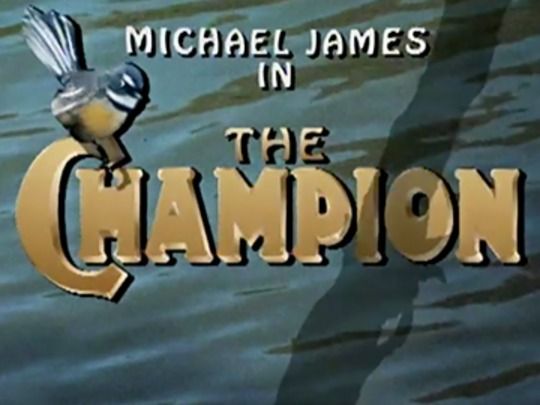


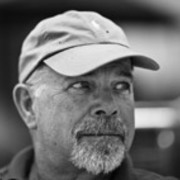




 Producer
Producer